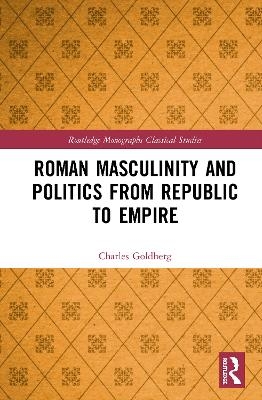
Roman Masculinity and Politics from Republic to Empire
Routledge (Verlag)
978-0-367-48046-2 (ISBN)
In deliberations in the Senate, at social gatherings, and on military campaign, displays of consensus with other men greased the wheels of social discourse and built elite comradery. Through literary sources and inscriptions that offer censorious or affirmative appraisal of male behavior from the Middle and Late Republic (ca. 300–31 BCE) to the Principate or Early Empire (ca. 100 CE), this book shows how the vir bonus, or "good man," the Roman persona of male aristocratic excellence, modulated imperatives for personal distinction and military and sexual violence with political cooperation and moral exemplarity. While the advent of one-man rule in the Empire transformed political power relations, ideals forged in the Republic adapted to the new climate and provided a coherent model of masculinity for emperor and senator alike. Scholars often paint a picture of Republic and Principate as distinct landscapes, but enduring ideals of male self-fashioning constitute an important continuity.
Roman Masculinity and Politics from Republic to Empire provides a fascinating insight into the intertwined nature of masculinity and political power for anyone interested in Roman political and social history, and those working on gender in the ancient world more broadly.
Charles Goldberg is an Assistant Professor in the Department of History at Bethel University, USA. He studies Greek and Roman political culture, and has published on the history of gender, imperialism, and religion.
List of figures; Preface; Acknowledgements; List of abbreviations; Introduction; Masculinity, individuality, and the persona; Chapter outline; Chapter One: The Roman Vir; Power, aggression, and dominance; Tyranny and the vir malus; "Republican" masculinity; Conclusion; Chapter Two: The Old Boys’ Club in the Middle Republic; Early values: the convivial brotherhood; Father knows best: imitatio patris; The censor’s task; Militiae: the bad man abroad; Militiae: the good man abroad; Domi: the bad man at home; Domi: the good man at home; Competition from within: electoral contexts; Competition from below: the business class; Conclusion; Chapter Three: Vir and Populus in the Late Republic; A changed political world; Courting the populus; Changes to training and education; Cato and Caesar; Popular apotheosis; Vir divus: Pompey’s command in the East; Conclusion; Chapter Four: Decline and the Imperial Senate; The motif of the decline of manliness; Forging a moral consensus; Imperial electioneering; Competition in performative oratory and literature; Oppositional stances; Agricola’s gloria through obsequium; Chapter Five: Good Emperors and Good Men; Pliny’s optimus princeps; Tiberius in the SC de Cn. Pisone Patre; Imperial exemplarity; Youth’s alternative: Caligula and Nero; Epilogue; Bibliography
| Erscheinungsdatum | 15.01.2021 |
|---|---|
| Reihe/Serie | Routledge Monographs in Classical Studies |
| Zusatzinfo | 6 Halftones, black and white; 6 Illustrations, black and white |
| Verlagsort | London |
| Sprache | englisch |
| Maße | 156 x 234 mm |
| Gewicht | 453 g |
| Themenwelt | Geschichte ► Allgemeine Geschichte ► Vor- und Frühgeschichte |
| Geschichte ► Allgemeine Geschichte ► Altertum / Antike | |
| Sozialwissenschaften ► Soziologie ► Gender Studies | |
| Sozialwissenschaften ► Soziologie ► Spezielle Soziologien | |
| ISBN-10 | 0-367-48046-8 / 0367480468 |
| ISBN-13 | 978-0-367-48046-2 / 9780367480462 |
| Zustand | Neuware |
| Informationen gemäß Produktsicherheitsverordnung (GPSR) | |
| Haben Sie eine Frage zum Produkt? |
aus dem Bereich


